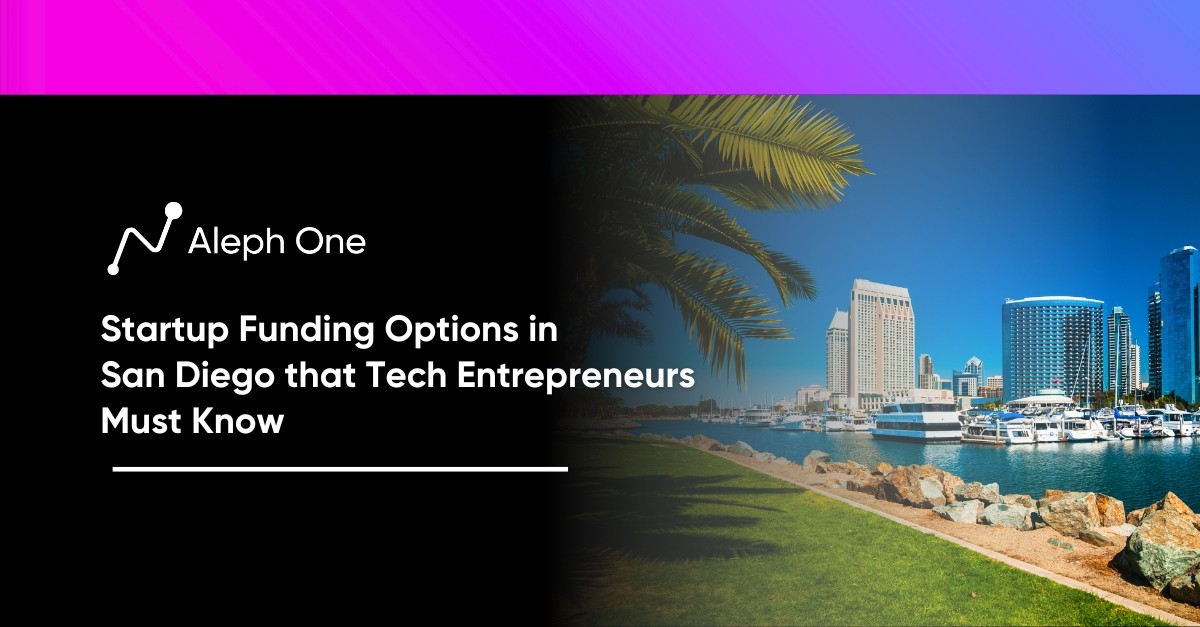Let’s work together to build something amazing. Share your project details and our team will reply to figure out the next steps to your success.

San Diego, a thriving hub of innovation and entrepreneurship, offers diverse funding options for tech startups. From venture capital to angel investors, crowdfunding, bank loans, grants, and revenue-based financing, this article goes deep into the various avenues available to tech entrepreneurs in San Diego. Whether you’re a budding startup or an established company looking to expand, understanding the funding landscape in San Diego is essential for securing the necessary capital and fueling growth.

Venture Capital: The VC Boom in San Diego
According to deal data sourced from PitchBook and analyzed by Connect, San Diego has experienced tremendous growth in venture capital funding over the past decade. Venture capital funding to companies in San Diego County totaled more than $3.4 Billion, invested in 232 deals in San Diego startups. This influx of capital has been driven by the success of local startups like Illumina, Qualcomm, and ServiceNow and the emergence of new VC firms focused specifically on San Diego companies.
Major VC Firms Investing in San Diego
Major VC firms like WestRiver Group, Avalon Ventures, and Domain Associates actively invest in innovative San Diego startups, especially in the software, life sciences, and healthcare IT sectors. WestRiver Group, for example, recently raised $300 million for its third fund to invest in early-stage cloud and enterprise software startups. Avalon Ventures, one of the most prominent VC firms in San Diego for the past 30 years, invests broadly in both tech and life sciences companies. And Domain Associates, which has offices in San Diego and Princeton, NJ, manages over $3 billion in capital focused on healthcare and biotech startups.
Is VC Ideal for San Diego Startups?
VC funding is ideal for San Diego startups with high growth and scale potential. It also comes with more restrictions and control from investors than other funding sources. VC firms typically invest in exchange for equity in the startup and expect significant returns, often aiming for 3 to 10 times their investment within 3 to 7 years. They also require board seats and play an active role in advising and monitoring their portfolio companies.
Venture Capital Funding for Scalable Startups
For innovative startups with a scalable business model, VC funding can be an attractive option in San Diego. The influx of new VC firms and capital in the region means more opportunities for ambitious founders to get their companies off the ground and achieve high growth. With its large talent pool, research institutions, and established tech and life sciences sectors, San Diego is poised to produce more VC-backed startups in the coming decade.
Angel Investors: Why San Diego’s Angel Groups are Thriving
San Diego has a robust angel investor network that provides critical early-stage funding for local startups. Angel groups like Tech Coast Angels and San Diego Angel Conference invest millions annually in San Diego companies. Angel funding is an attractive option for startups raising between $500,000 to $2 million to get their business off the ground.
Tech Coast Angels
Tech Coast Angels is one of the largest and most active angel groups in the U.S. Founded in 1997, TCA has invested over $270 million in more than 520 companies. TCA members are accredited investors, primarily successful entrepreneurs, and executives. They support a range of industries, including software, hardware, IT, medical devices, and life sciences. TCA offers both funding and mentoring to help startups achieve critical milestones.
The San Diego Angel Conference
The San Diego Angel Conference is a newer angel group focused on diversity and inclusion. They have invested more than $10 million in San Diego startups since launching in 2017. The group holds pitch competitions several times a year where around ten startups are selected to pitch to a network of over 200 angel investors. Winners receive investments of $200,000 or more. The San Diego Angel Conference is helping to broaden access to capital for underrepresented founders in the San Diego startup ecosystem.
Angel Funding
Angel funding provides more flexibility and better terms than venture capital for early-stage startups. However, angel investment also comes with risks for entrepreneurs. Angels typically invest smaller amounts, so startups may need to piece together funding from multiple angels. There is also less oversight and mentoring than traditional VC. Startups should ensure any angels they work with have experience investing in their industry and stage.
San Diego’s angel groups are thriving and supporting the region’s next generation of innovative startups. For entrepreneurs looking to raise seed funding, pitching to established angel groups is a proven pathway to securing capital and gaining credibility in the eyes of future investors.
Crowdfunding: How Startups are Leveraging the Crowd
Crowdfunding has become an increasingly popular way for San Diego startups to raise capital from many small contributions.
What is Crowdfunding?
Crowdfunding allows startups to raise money from many people, typically in exchange for a product pre-order or other rewards. It taps into the “crowd” to provide funding, gaining validation from potential customers and supporters. While crowdfunding campaigns typically raise smaller amounts of funding, between $10,000 to $500,000, it offers more flexibility than equity-based options like venture capital.
Crowdfunding for Consumer Product Startups
For consumer product startups, crowdfunding is an ideal way to gauge market demand before a product launches. By offering the product at a discount in exchange for early funding, startups can validate the idea and gain valuable feedback. Some of the most well-known San Diego startups funded through crowdfunding include Oculus VR, which raised over $2.4 million on Kickstarter, and Pono Music, which raised $6.2 million.
While crowdfunding provides more flexibility than equity financing, it also comes with uncertainty. A campaign may not meet its funding goal, so the startup receives no funds. Crowdfunding also typically raises smaller amounts of capital, so it may fail to meet the needs of startups with high manufacturing costs. However, crowdfunding remains an attractive first step for the right startup type to raise money and validate a new product.
Bank Loans: Why Traditional Loans Remain Relevant
While not ideal for early-stage startups, bank loans are a viable option for established companies with collateral and a proven track record. Bank loans provide debt-based capital that must be repaid with less dilution than equity financing. They are a stable source of funding for companies focused on steady growth.
Why are Bank Loans a Viable Option for Startups?
For startups that have been in business for at least 2-3 years and have substantial assets or revenue, bank loans are worth considering. The most common types of bank loans for startups are term loans, lines of credit, and commercial mortgages. Term loans provide a lump sum of capital paid back over a fixed period with interest. Lines of credit offer more flexibility with access to revolving credit that can be drawn and repaid. Commercial mortgages are secured loans using commercial property as collateral.
How to Get a Bank Loan
To qualify for a bank loan, startups need good credit, audited financial statements, tax returns, business plans, and collateral. The loan application can take 3-6 months and substantial documentation. Interest rates on bank loans are lower than other financing options, ranging from 3 to 25 years.
Banks Serving San Diego
The significant banks serving the San Diego startup community include Wells Fargo, US Bank, and California Bank & Trust. Several community banks like Torrey Pines Bank and Mission Valley Bank provide loans to local small businesses. The Small Business Administration guarantees some bank loans through programs like the 7(a) and 504 loans. With an SBA guarantee, startups can qualify for bank loans with less collateral and lower interest rates.
While bank loans have more requirements and longer processes than other funding options, they remain a relevant source of capital for San Diego startups. For companies that need significant capital to expand into new facilities, purchase equipment, or finance longer-term growth, bank loans offer a stable solution with reasonable interest rates and terms.
Grants: Free Money for Innovation
San Diego startups in industries like biotech, healthcare, and cleantech are tapping into federal and state grants. The Small Business Innovation Research (SBIR) program has awarded over 179,000 grants totaling more than $54.3 billion since 2019. The California Energy Commission has granted over $3.4 million to San Diego companies. Grants provide non-dilutive funding for research and development, but they are highly competitive and limited to specific industries and activities.
The SBIR Program
The SBIR program offers grants for technology development and commercialization. San Diego startups have received over $2 billion in SBIR grants in the last decade, especially in the life sciences. For example, San Diego’s Anthropic was awarded $1 million to develop AI safety techniques, and Prometheus Biosciences received $2 million for new treatments for inflammatory bowel disease. The SBIR program is only open to US-based small businesses. It requires applicants to meet the government’s definition of a small business based on the number of employees and revenue.
California Energy Commission (CEC) Grants
The California Energy Commission (CEC) offers millions of yearly grants for companies developing clean energy technologies. San Diego grant recipients include $3 million to Natel Energy for low-impact hydropower systems and $5 million to HyperSciences for hypersonic propulsion systems. The CEC considers proposals from companies of any size, but the technologies must-have applications for reducing greenhouse gas emissions and advancing clean energy.
State Programs and Grants
Other state programs like the California Competes Tax Credit and the Governor’s Office of Business and Economic Development (GO-Biz) offer grants, loans, and tax incentives for companies creating jobs and economic growth in California. While competitive, these programs have supported San Diego startups in manufacturing, biotech, and other industries.
Grants are an attractive funding option for San Diego startups because they provide non-dilutive capital for crucial business activities. However, grants are highly competitive, limited to specific types of companies and projects, and often take 6-18 months to obtain approval. For startups with a solid match for available grants, the time and effort can be well worth the reward of securing free funding. But for most startups, grants should not be a primary funding strategy and are best combined with other sources like VC, angel, or revenue-based financing.
Revenue-Based Financing: An Alternative to Debt or Equity
Revenue-based financing is an emerging funding option for San Diego startups. With this model, investors provide upfront capital to a company in exchange for a percentage of the company’s future revenue over a fixed period, typically 3 to 5 years. The capital is repaid through the revenue share rather than fixed interest and principal payments like a traditional loan.
Benefits of Revenue-Based Financing for Startups
This innovative funding mechanism offers more flexibility than debt financing since the repayment amount is directly tied to revenue. Startups pay more when generating more revenue and less when revenue is down. This helps companies avoid fixed debt servicing costs and prevent default risk. Revenue-based financing is less dilutive than equity financing since companies are not giving ownership shares.
Revenue-Based Financing Platforms
Revenue-based financing platforms like Lighter Capital and Kapitus have funded over $500 million for startups nationally. They target fast-growing companies in e-commerce, software, and other tech-enabled service industries. For San Diego startups with steady month-over-month revenue growth, revenue-based financing can be an attractive middle ground between equity and debt.
Downsides of Revenue-Based Funding
However, there are some downsides to consider. Revenue-based financing may be more expensive than equity or debt if a startup’s revenue growth is prolonged. The revenue share also represents an ongoing cost of capital that lasts several years. In contrast, equity financing is a one-time transaction. There is also less historical data on default rates with this new model than with traditional debt.
For the right startup, revenue-based financing can be an innovative option to fund growth without excessive dilution or interest payments. It taps into the recurring revenue stream of a company to provide flexible financing tailored to its actual performance. For fast-growing San Diego startups, especially in the B2B software and services space, revenue-based financing deserves a close look as an alternative to more traditional funding sources. With more capital providers entering this market, revenue-based financing is poised to become an increasingly compelling choice for startups.
Startups Thrive in the San Diego Ecosystem
San Diego is a fertile ground for tech entrepreneurs seeking funding to propel their ventures to new heights. With a flourishing ecosystem of venture capital firms, active angel investor groups, the power of crowdfunding, traditional bank loans, grants for innovation, and the emergence of revenue-based financing, the funding possibilities are vast and varied. The city’s vibrant entrepreneurial spirit and strong tech and life sciences sectors present many opportunities for startups to secure the capital they need to thrive.
Get the latest news and updates from Aleph One in your inbox.



